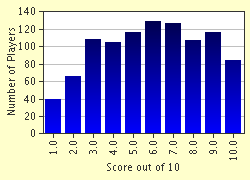Quiz Answer Key and Fun Facts
1. Find f'(x) (the derivative of f(x)) if f(x) = 7x^3 - 2x^2 + 4x - 5.
2. The integral of 3x^2 - 4x + 1 equals x^3 - 2x^2 + x. Is this always correct?
3. Find dy/dx if y = e^a and a is constant.
4. If f(x) = x (ln x), find f'(x).
5. If the velocity of a particle at time t is represented by the equation v(t) = 8t + 2, find the position of the particle at time 3 if the position at time 0 is 0.
6. An object is in freefall. It remains in freefall for 5 seconds before it hits the ground. How high was the object when it first started falling if its starting velocity was 0? (Acceleration due to gravity is -9.8 meters/second^2).
7. Okay, an easier one. If f(x) = (sin x)/x, what is the limit of the function as x approaches zero?
8. Find the area of the region bounded by the graphs of y = x^2; x = 0; x = 2; and the x axis.
9. If f(x) = e^x, the integral of f(x) always equals the derivative of f(x).
10. If f(x) = x^3 - 2x^2 + 4x + 1, how many inflection points does this graph have?
Source: Author
Diamondlance
This quiz was reviewed by FunTrivia editor
CellarDoor before going online.
Any errors found in FunTrivia content are routinely corrected through our feedback system.

